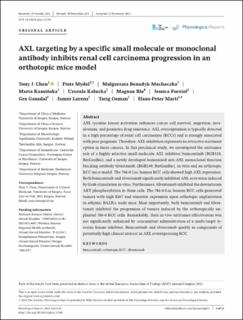| dc.contributor.author | Chen, Tony Jialiang | |
| dc.contributor.author | Mydel, Piotr Mateusz | |
| dc.contributor.author | Benedyk-Machaczka, Małgorzata | |
| dc.contributor.author | Kamińska, Marta | |
| dc.contributor.author | Kalucka, Urszula | |
| dc.contributor.author | Blø, Magnus | |
| dc.contributor.author | Furriol, Jessica | |
| dc.contributor.author | Gausdal, Gro | |
| dc.contributor.author | Lorens, James Bradley | |
| dc.contributor.author | Osman, Tarig Al-Hadi | |
| dc.contributor.author | Marti, Hans Peter | |
| dc.date.accessioned | 2022-01-28T12:02:07Z | |
| dc.date.available | 2022-01-28T12:02:07Z | |
| dc.date.created | 2022-01-03T18:06:18Z | |
| dc.date.issued | 2021 | |
| dc.identifier.issn | 2051-817X | |
| dc.identifier.uri | https://hdl.handle.net/11250/2937359 | |
| dc.description.abstract | AXL tyrosine kinase activation enhances cancer cell survival, migration, invasiveness, and promotes drug resistance. AXL overexpression is typically detected in a high percentage of renal cell carcinomas (RCCs) and is strongly associated with poor prognosis. Therefore, AXL inhibition represents an attractive treatment option in these cancers. In this preclinical study, we investigated the antitumor role of a highly selective small molecule AXL inhibitor bemcentinib (BGB324, BerGenBio), and a newly developed humanized anti-AXL monoclonal function blocking antibody tilvestamab, (BGB149, BerGenBio), in vitro and an orthotopic RCC mice model. The 786-0-Luc human RCC cells showed high AXL expression. Both bemcentinib and tilvestamab significantly inhibited AXL activation induced by Gas6 stimulation in vitro. Furthermore, tilvestamab inhibited the downstream AKT phosphorylation in these cells. The 786-0-Luc human RCC cells generated tumors with high Ki67 and vimentin expression upon orthotopic implantation in athymic BALB/c nude mice. Most importantly, both bemcentinib and tilvestamab inhibited the progression of tumors induced by the orthotopically implanted 786-0 RCC cells. Remarkably, their in vivo antitumor effectiveness was not significantly enhanced by concomitant administration of a multi-target tyrosine kinase inhibitor. Bemcentinib and tilvestamab qualify as compounds of potentially high clinical interest in AXL overexpressing RCC. | en_US |
| dc.language.iso | eng | en_US |
| dc.publisher | Wiley | en_US |
| dc.rights | Navngivelse 4.0 Internasjonal | * |
| dc.rights.uri | http://creativecommons.org/licenses/by/4.0/deed.no | * |
| dc.title | AXL targeting by a specific small molecule or monoclonal antibody inhibits renal cell carcinoma progression in an orthotopic mice model | en_US |
| dc.type | Journal article | en_US |
| dc.type | Peer reviewed | en_US |
| dc.description.version | publishedVersion | en_US |
| dc.rights.holder | © 2021 The Authors. | en_US |
| dc.source.articlenumber | e15140 | en_US |
| cristin.ispublished | true | |
| cristin.fulltext | original | |
| cristin.qualitycode | 1 | |
| dc.identifier.doi | 10.14814/phy2.15140 | |
| dc.identifier.cristin | 1973934 | |
| dc.source.journal | Physiological Reports | en_US |
| dc.identifier.citation | Physiological Reports. 2021, 9 (23), e15140 | en_US |
| dc.source.volume | 9 | en_US |
| dc.source.issue | 23 | en_US |

